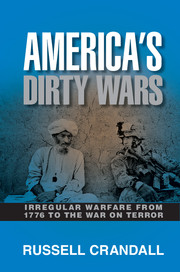Book contents
- Frontmatter
- Dedication
- Contents
- List of Figures
- Acknowledgments
- 1 Introduction
- 2 Irregular Warfare 101
- Part One The American Revolution to Chasing Sandino, 1776–1930s
- Part Two The Cold War, 1940s–1989
- Part Three Latin America and the Cold War, 1950s–1980s
- Part Four Post–Cold War, 1990s–2000s
- 26 Dirty Wars after the Cold War
- 27 Colombia
- 28 Iraq
- 29 Intermezzo
- 30 Post-9/11 COIN in the Philippines
- 31 Intermezzo
- 32 The Longest War
- 33 The Fall of Muammar Qaddafi, 2011
- 34 Intermezzo
- 35 Conclusion
- Epilogue “I Feel More Like a Monster”
- Notes
- Bibliography
- Index
28 - Iraq
Published online by Cambridge University Press: 05 July 2014
- Frontmatter
- Dedication
- Contents
- List of Figures
- Acknowledgments
- 1 Introduction
- 2 Irregular Warfare 101
- Part One The American Revolution to Chasing Sandino, 1776–1930s
- Part Two The Cold War, 1940s–1989
- Part Three Latin America and the Cold War, 1950s–1980s
- Part Four Post–Cold War, 1990s–2000s
- 26 Dirty Wars after the Cold War
- 27 Colombia
- 28 Iraq
- 29 Intermezzo
- 30 Post-9/11 COIN in the Philippines
- 31 Intermezzo
- 32 The Longest War
- 33 The Fall of Muammar Qaddafi, 2011
- 34 Intermezzo
- 35 Conclusion
- Epilogue “I Feel More Like a Monster”
- Notes
- Bibliography
- Index
Summary
The Iraq War was a war of choice, not necessity.
– Thomas Ricks and Bernard Trainor[The U.S. military] has developed over time a singular focus on conventional warfare . . . which left it ill-suited to the kind of operation it encountered as soon as conventional war-fighting ceased to be the primary focus in [Iraq].
– Brigadier Nigel Aylwin-Foster, British ArmyBe polite, be professional, but have a plan to kill everybody you meet.
– General James Mattis to a group of MarinesOn the morning of March 21, 2003, the U.S. military launched its invasion of Saddam Hussein’s Iraq. It was familiar territory for American commanders, given that the U.S. military had devastated Hussein’s forces in the Gulf War a decade earlier. In many respects, U.S. planners expected a sort of “Gulf War Redux,” believing that the Iraqi military’s vaunted Republican Guard would be their main foe in the push to take the capital of Baghdad and remove Hussein from power. Five divisions (three U.S. Army, one U.S. Marine, and the British 1st Armoured Division with attached Royal Marine Commandos) led the way in what was called a blitz-like operation, using vastly superior mobility, technology, and training to take Baghdad in two weeks. Interestingly, the invading force was roughly 150,000 troops, about half the number that some senior U.S. planners had advocated in the lead-up to the war.
The chief operational strategy in the invasion, known as Operation Iraqi Freedom, was “shock and awe,” designed to overwhelm the enemy’s defenses, decapitate Saddam Hussein’s command infrastructure, and bomb the apparatus of the Iraqi state into submission. On the highways leading to Baghdad, infrared gun camera footage and night-vision devices transmitted sanitized images of the war back to the West. Friendly casualties were light, and Iraqi troops abandoned their positions and surrendered to the Coalition en masse. Precision-guided munitions dropped from the air eliminated the Iraqi troops who remained at their posts.
- Type
- Chapter
- Information
- America's Dirty WarsIrregular Warfare from 1776 to the War on Terror, pp. 363 - 392Publisher: Cambridge University PressPrint publication year: 2014



